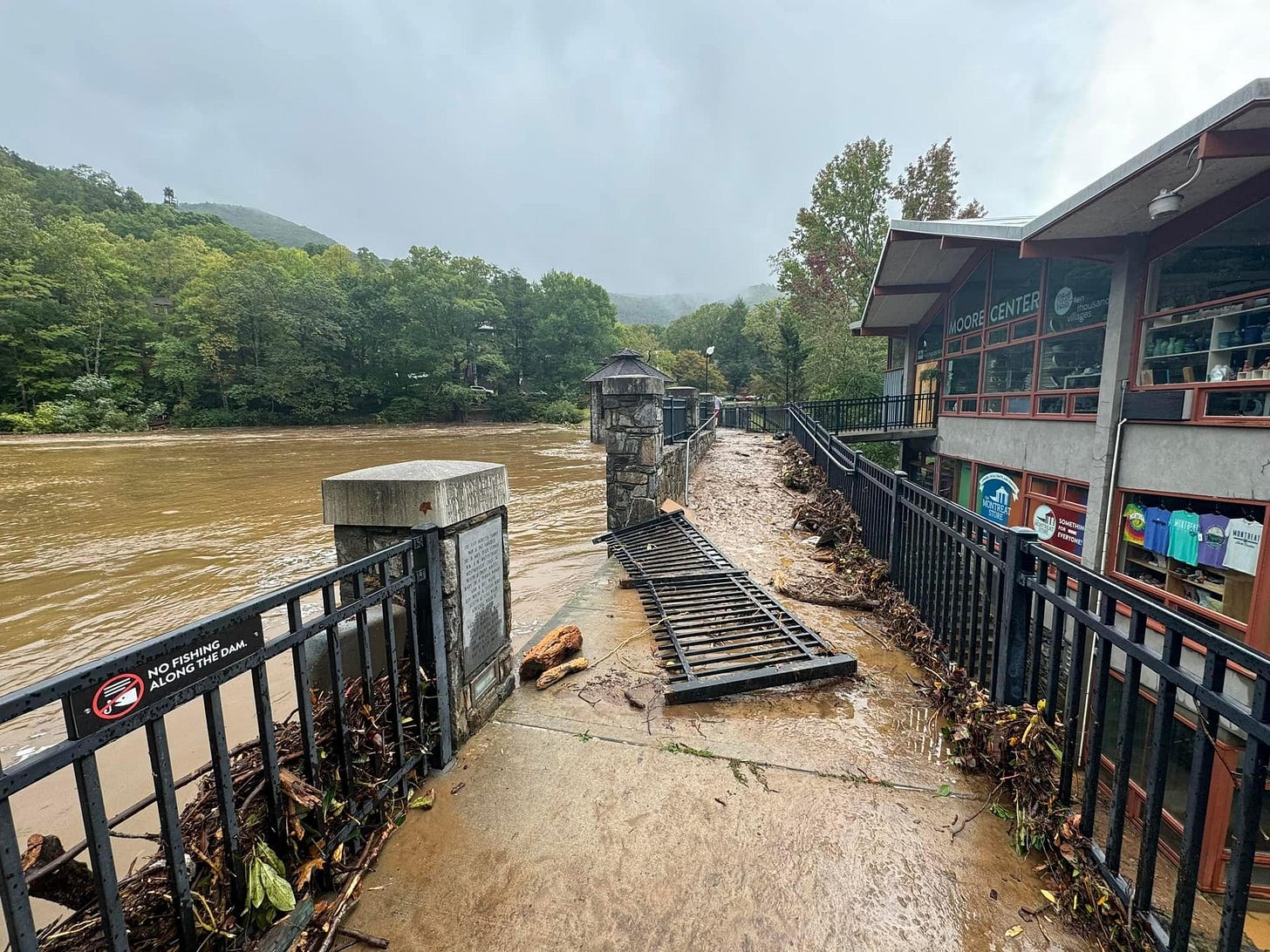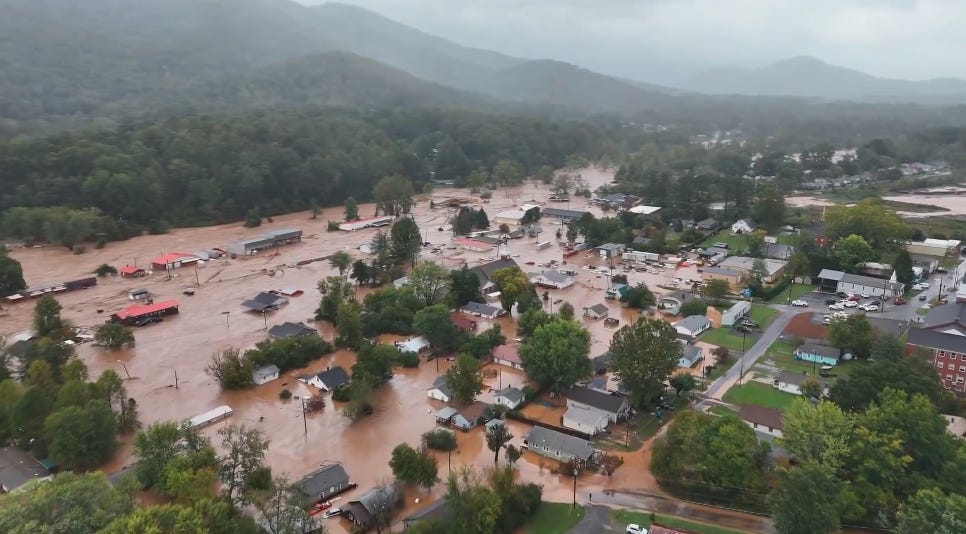Living Gifts
Keep watch for Grace
Are any among you suffering? They should pray.
Are any cheerful? They should sing songs of praise.
Are any among you sick? They should call for the elders of the church and have them pray over them, anointing them with oil in the name of the Lord.
The prayer of faith will save the sick, and the Lord will raise them up, and anyone who has committed sins will be forgiven.
James 5:13-15
I’m a preacher in Vermont, but Hurricane Helene has made it hard for me to focus on writing and preaching the past couple of days. Home is hurting. During an extended information blackout with communications completely down for the whole of Western North Carolina (not to mention power and water), I finally heard from my parents this morning. They’re good. They’re safe, and so is the rest of my family. And they didn’t take much property damage. Much of the rest of the region isn’t as lucky.
The word we all seem to fumble for in the past couple of days has been “devastating.” I guess that’s the placeholder word for when things are unspeakably bad but you need something to describe the pain has torn open like all the asphalt. It used to amaze me to know that I could drive my car from Los Angeles to the boonies of any place and know that my wheels would stay connected to a contiguous road the whole way from Hollywood to home. That isn’t the case anymore.
Part of what’s devastating is the perceived nonchalance from mass media and national politicians who don’t seem to know how to politicize this—normally a blessing for the issues we know dear, but for God’s sake, won’t somebody politicize this? Won’t somebody make my loved ones enough of a priority to pander to us with some real help?
At the same time, maybe some of this feeling is just helplessness in the face of being smacked by forces we thought the mountains protected us from. And maybe we’ve seen national news coverage of disasters that ours feels surely as bad as if not worse, but maybe some of us have been a little casual in the face of them once before. After all, life goes on. Football goes on—hell, I’ve watched some of it this weekend.
I know these floods and timbers and mud and death and poverty-that-somehow-just-got-poorer is distant for most of us. There have been floods that hit close here to Vermont last summer and this summer that the world surely cared about, but you can only care so much. So many of us all over are living in personal disasters and hard times that feel like they’ll never end. We just deal.
And so even before all that, earlier this week as I was mulling over what to preach on this morning, the lectionary (schedule of readings followed by many churches) provided a challenging set of texts. The options for lectionary preachers are a slightly strange story from Numbers 11, others are reading a tiny snapshot of Esther that takes too long to explain, much like so much of the Old Testament feels with its typical grit and reality of human sin on display. The Psalms are always there to fall back on, and Psalm 19 is a beauty, but it’s always got a couple of lines that you know people trip on, like “the fear of the Lord” or “the law of the Lord,” which we know are concepts that have been used as weights instead of life rafts. James 5 is a bit awkward this week, talking about prayer in a way we know we can’t accomplish, boasting how Elijah could pray to make the rain start and stop…well that sure would be nice right now! Too bad we’re not a prophet with a red landline straight to heaven.
Even our Jesus reading today (Mark 9:38-50) has him playing less Comforter and more in his Spiritual Drill Sargeant mode. Some don’t know that Jesus actually did sometimes talk about hell and a wretching pain there. This shocks and scandalizes many of us who thought Jesus was only ever about Good Times and Good Vibes. On the other hand, maybe it is a strange comfort when times and vibes and people aren’t so good, like a video I saw of a woman hollering up a storm at a bear trying to poach her pets.
Timing is everything, and these readings just feel like such the wrong time. Most preachers don’t have to preach from them, we could audible to something else. But I have quit too many things in my life for my pride’s liking, and so I don’t want to quit on these Scripture readings. And there are some good lessons here for sure, and the fruit’s not hanging too high either; when Jesus says, “Who is not against us is for us,” this is an important reminder that God’s grace works beyond our bounds, which is sorta the Numbers 11 reading too. We think we can tell God how he’s supposed to work, and God laughs. We trust that God works outside of the church in the world all the time, why it’s a wonderful thing our church is helping a non-profit build an expansion even if it’s not the church doing it, why tons and tons of people who don’t believe in God at all can still be used by him to do good in the midst of disasters in the mountains.
But more than focusing on lessons from any of these texts, I think it’s an opportunity to zoom out and talk about the wider challenge of encountering the Bible, and maybe an opportunity to talk about Grace.
Just earlier this week, someone was asking me about Grace, how we use it as Christians, how we misuse it. What is it, besides The Thing Before You Eat? Like “love,” it’s so big and amorphous to be often meaningless. It’s often treated like a synonym for mercy. It’s at least “Amazing,” we know.
But Grace is none of these things and all of these things. In Christian theology, its New Testament roots come from charis, or gift. Pardon the corn, but it’s the ultimate Gift that keeps on giving—which includes things like mercy, the food on our table, and iconic music. And maybe it’s confusing and amorphous because it’s so central to who Christ is and how Christ taught and how God loves us. Grace is the word for the Gift that reminds us how all else is a gift: the Torah was a gift, the Law was a gift, and indeed Scripture is not first and foremost a set of rules, but a set of gifts. When we encounter the Bible, we are trying to open whatever gift it’s showing us today.
Something I Should Do Again
I used to have a gratitude practice (it’s a little embarrassing to have to include that “used to” in there, but just being honest). I can’t remember who taught it—maybe some spiritual podcaster in a bygone era of my personal lore—but it was a simple one: just take a few minutes to say “thank you” to absolutely everything that enters your mind before you even know why (as I type this out, I can’t help but think man, I should do this again, so thank you guilt).
If you want to try this out, you first do it for emotionally neutral things, like mundane objects around you. These are the things you overlook. As I type now, I can look right and say thank you for the silver spoon that mixed fake sweetener in my cofee this morning. That was a little gift I took for granted. Many times in this old practice I’ve said “thank you” to the door knob, because hey, I didn’t invent it, and somebody at some point thought you know what, it’d be nice to get in and out of a room in a sturdy way, but also not let any old person just come in whenever they want. Amazing invention.
The gratitude practice advances to things that are more and more challenging…maybe you think of your shortcomings and self-conscious stuff, maybe you think of a hard abstract problem. Maybe you think of someone you really can’t stand, and you say “thank you” for them before you know why, and now you’re really stuck. You stay in the thank you for a while until you can give an honest reason why. Maybe you start with, “Thank you Lord that I’m not like them!” But if you stay in the “thank you,” and you return to that practice over days and weeks, you might get bored enough to be more charitable (another word with that Grace-full charis root). And you might say thank you for something more genuine that you forgot about that person, like a quality of their personality you often overlook. For the really impossible hurts that the pain is too raw and real to even attempt this, you might think of gifts you got in spite of them, what you’ve gathered and overcame from the hell they put you through, and now you know you can overcome hell-on-earth and find Grace in its ashes. An incredible gift.
Whether you ever do this exercise or not, some kind of gratitude practice really is important (and I must guilt myself into doing one again) because whether it’s disasters or challenging Scripture or just our normal daily grind of a life, so often our default mode is missing all the gifts. “Count our blessings” is a cliché reminder because so many of us by default don’t. If we weren’t raised to—and even if we were—it’s often not in our natural habits to look for graces unless we practice.
Scriptural Wrestling
So if we’re not practiced at saying “thank you” to whatever Scripture is saying long enough to dig into it, long enough to want to learn more about it, long enough to want to have more understanding of this living faith, we will not see Scripture as a gift, but a curse. Not one curse, a set of dead curses. But it’s not a set of dead curses. It is a living gift, with many living gifts inside. And it is God’s way to try to form us into living gifts, which includes the formation of wrestling with Scripture we just don’t like. And whether it’s the Bible or God, we can often do no better than Jacob who wrestled with God until he limped, telling him, “I will not let you go until you bless me.”1
That intimate wrestling relationship with God is about much more than Scripture. That just happens to be the meeting place for Christians to wrestle together. But it is in the rest of our lives, in those moments where we’re so deep in a present hell that we can’t be bothered to think about that afterlife one, where sometimes the biggest grace our faith can give us is the angry, splotchy, ugly-cry of the prophets, “I won’t let you go, God, until you bless me.”
And the miracle is that when we do that, there will be more living gifts, and there will always be Grace somewhere to be found in the rubble, for our God yearns for us to seek after him,2 for the One who calls you is faithful, and he will do this.3
The Grace of Prayer
All this said, I do want to focus on something from our reading this week. It is, after all, my job to try and retrieve something from our week’s texts to share with the class. So I want to think more about this Grace thing with how James talks about prayer, and why no matter how cynical we may get about “thoughts and prayers”—which James would very much agree needs to be backed by material help—prayer is still our lifeline into Grace. Prayer is how we stay in that wrestling relationship with God.
Prayer above all teaches us (as Calvin noted) that while we pray to God, prayer is more fundamentally a gift from God to us. As Jesus says in John 5, he doesn’t need human glory or praise. To be in communion with Him is the blessing from which all others flow. So when we pause before we chow down on the day’s bread, we probably are phrasing it wrong. We don’t “say grace” as much as we open our mouths to receive it in prayer.
It is just one more paradoxical part of the paradoxical love language of the Gospel, where the things we are asked to do to serve others and love God are not things we “have to do” but things we “get to do,” for they are not burdens nor shackles but gifts into freedom.
And when we regularly live into a relationship of God’s gifts to us through the gift of prayer, we can more easily see Grace in the soaking splinters of our disasters. The horrors are still there, the struggles are rendered void, things are not magically okay. But when things are not okay is when we need to find Grace the most. And all over the North Carolina mountains, I can testify to this more truly than any human thing, that people are finding God’s graces in a million tiny moments of love to overflow every Appalachian heart.
What Now?
There is often the point where a preacher or writer or both will have to come up with a “what now?” What do we do with this? Some of these have impressed themselves enough: when the Bible is challenging, keep wrestling! And keep wrestling with it until you can say “thank you”—even the passages that preachers would rather ignore that week. Don’t let it go until it blesses you.
What else? Well, this week, if we’re nowhere close by, we could give what we can to some worthy cause. There are a million important things happening bigger than this disaster, but there are organizations on the ground right now that will be helped by the flexibility.4
And what else to do in the long run? I think James already covered this one: “Are any among you suffering? They should pray. Are any cheerful? They should sing songs of praise. Are any among you sick? They should call for the elders of the church and have them pray over them.”
For prayer is one of the gifts of God that helps us stay in touch with all of the other gifts. And if you haven’t prayed in forever or ever at all, I like Anne Lamott’s short-but-sweet book on prayer for starters, Help, Thanks, Wow. There is more to it than this, but her basic formula for praying can be bracketed in those three ways: help me God, thank you Lord, and wow, when I think about it more deeply, God, you have done amazing things for me.
While we still figure out how bad things are in the mountains, in prayer we can say, “Help me in my despair, and help us all be your living gifts to each other.” We can say (as one congregant told me this week), “Thank you for every single person and thing in my life for the gifts that they bring.” And we can say, “Wow. Holy Cow. In spite of everything, this really is an amazing world you have blessed me with living in.”
And I pray so dearly that if you are in the midst of disaster this week, that you may have at least one moment when the Grace of God leaves you speechless.
North Carolina will rebuild. Right now it needs immediate disaster relief. If you would like to give to a local church that has been making meals and giving info and doing just about everything, here is a note from my father: “If you are looking for a great place for donations, I know Black Mountain Presbyterian Church and highly recommend them. There will be other organizations worthy of support over time… but if you want to make an immediate impact, I recommend this one. Thank you to all of the leadership… it is so hard. Make donations at https://bmpcnc.org/give. Put hurricane relief in memo line.”
Gen 32:26
Isaiah 65:1
1 Thess 5:24)









